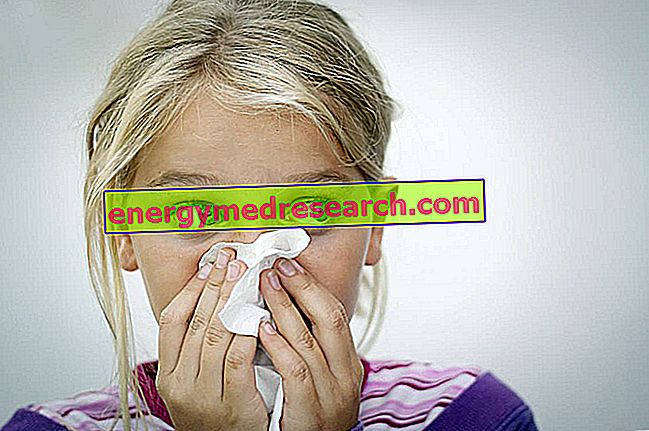Mouth ulcers are lesions that affect the oral mucosa (lips, cheeks, tongue and sublingual region).
They are typified by circular ulcers with a diameter of 2-5 mm; rarely exceed the centimeter. Generally, ulcers are shallow and appear to be circumscribed by a red halo. They appear individually or in large numbers.

It is not a serious condition but sometimes it is related to higher disorders.
Ulcers heal within two weeks at the most, but they easily recur.
Affect at least once 20-60% of the population; they are more frequent in adulthood.
If the mouth sores appear in the mouth and recur regularly, they correspond to the diagnostic profile of recurrent aphthous stomatitis.
What to do
- At the first appearance of mouth ulcers, seek medical attention: he will analyze the condition and assess the relevance of a further diagnostic study.
Let us not forget that canker sores can be triggered by more serious diseases; in this sense they represent a very important indication for a possible early diagnosis.
- NB . If the ulcerations extend to the semi-mucous membranes and to the genital mucous membranes (foreskin, glans, small and labia majora), and are associated with ocular alterations (iritis) and / or lesions of other organs, the diagnosis is of aphthous or Behçet's syndrome (disease likely to be autoimmune).
- Recognize symptoms promptly: most aphthae cases have a medical history that facilitates rapid identification of symptoms:
- The first clue is a burning that appears one or two days before in the mucosa still intact.
- Followed by the increase in pain, swelling and redness in proportion to the formation of abrasions.
- Follow a balanced diet and prevent the deficiency of zinc, iron, folic acid and vitamin B12.
- Follow a regular lifestyle and prevent stress.
- Perform diagnostic investigations for food allergies and intolerances.
- In case of positivity, eliminate harmful factors.
- Maintain good oral hygiene and use mouthwash.
- If present, properly treat autoimmune diseases; in these cases the resolution of canes is of marginal importance.
- Treat or compensate for hormonal disorders and metabolic disorders.
- Pay attention to chewing and tooth brushing to avoid excessive physical stress.
What NOT to do
- Ignore the symptoms and do not seek medical attention.
- Eating incorrectly (see What NOT to Eat below):
- Have nutritional deficiencies of iron, zinc, folic acid and vitamin B12.
- Consume the foods and drinks associated with the onset of canker sores.
- Do not investigate the diagnostic investigations for allergies and intolerances.
- Have poor oral hygiene.
- Neglecting primary pathologies (hormonal, autoimmune metabolic, etc.).
- Subject the mucous membranes of the mouth to excessive chemical-physical stress:
- Bring very acid liquids or solids to the mouth, breathe through your mouth when handling solvents or other toxic products, etc.
- For example, using dental prostheses or objects (scuba divers' mouthpiece, wrestler's mouthguard, etc.) which, due to their unsuitable shape, damage the mucous membrane.
- Try to disinfect canes with alcoholic beverages and spicy foods.
- Maintain a stressful lifestyle.
What to eat
- Iron-rich foods: muscle tissue of terrestrial and aquatic animals (horsemeat, bovine, porcine, avian, fish, whole shellfish, whole crustaceans, etc.), eggs (any, especially the yolk), offal and fifth quarter (especially spleen and liver, but also marrow, diaphragm, heart, etc).
- Foods rich in zinc: fish, red meat, cereals, legumes and dried fruit.
- Foods rich in folic acid: liver, vegetables (eg tomatoes), fruit (orange, apple, etc.) and legumes (eg beans).
- Foods rich in vitamin B12: the same foods source of heme iron;
- Foods rich in vitamin C: peppers, citrus fruits, parsley, kiwi, lettuce, pineapple, broccoli, chicory, new potatoes, tomatoes, cap, cherries, strawberries etc. Fresh and possibly raw.
- Foods rich in vitamin D: fish, fish oil and egg yolk.
- Foods rich in probiotics: yogurt, buttermilk, kefir, tofu, tempeh, etc.
What NOT to Eat
Mouth ulcers are statistically related to the abuse of certain foods and beverages. These are:
- Spirits: wine, beer, spirits.
- Spicy foods: especially chilli and pepper.
- Animal fats: those of saturated type (cheeses and fatty cuts of meat); even hydrogenated vegetable lipids are part of the foods to avoid.
- Dried fruits: walnuts, hazelnuts, almonds, pistachios etc.
- Mustard.
- Cheeses.
- Chocolate.
It is also advisable to avoid:
- Gluten in case of celiac disease.
- Foods containing allergenic principles.
Natural Cures and Remedies
- Supplements and plants useful for supporting the immune system:
- Vitamin C: antioxidant. Accelerates the healing of oral ulcers.
- Vitamin D: immunostimulant.
- Antioxidant complex: vitamins (A, C, E), mineral salts (zinc and selenium) and polyphenols.
- Probiotics: based on bifidobacteria, lactobacteria and eubacteria.
- Herbal medicine:
- Immunostimulant plants to be taken in the form of herbal tea or extract: Androgafis, Astragalus, Echinacea, Eleutherococcus, Mistletoe, Uncaria, Cordyceps, Garlic, Aloe gel, Curcuma
- Calendula: anti-inflammatory and healing.
- Ribes: anti-inflammatory action.
- Rosa canina: contains vitamin C in high concentration.
- Lemon: disinfectant property and contains vitamin C.
- Propolis (NOT in alcohol tincture): it is a good antiseptic.
- Activities that facilitate psycho-physical relaxation, for example:
- Mental training (autogenic or guided).
- Meditation.
- Aromatherapy.
- Yoga.
Pharmacological care
WARNING! Drug therapy has no effect on the frequency of episodes and is only useful to speed up healing.
- Corticosteroids: in medical mouthwashes or massage pastes.
- Antibiotic and disinfectant products in general: useful above all to avoid complications on ulcerations.
- Immunosuppressants and immunomodulators: used very rarely, they usually constitute a necessary choice when the unruly action of the immune system causes more relevant discomforts.
Prevention
- The cause of the recurrent cases is of interest:
- Accurate oral hygiene (toothbrush and mouthwash).
- Respect the nutritional balance.
- Avoid nutritional principles responsible for allergy or intolerance.
- Eliminate alcohol.
- Not smoking.
- Avoid the chemical and physical stress of the mucosa.
- Reduce psychological stress.
- Treat any primary diseases.
Medical Treatments
- There are no medical treatments for mouth ulcers. The only exception is the interventions and corrections of a dental nature, but these are valid only if the stomatitis is caused by an annexed problem.



